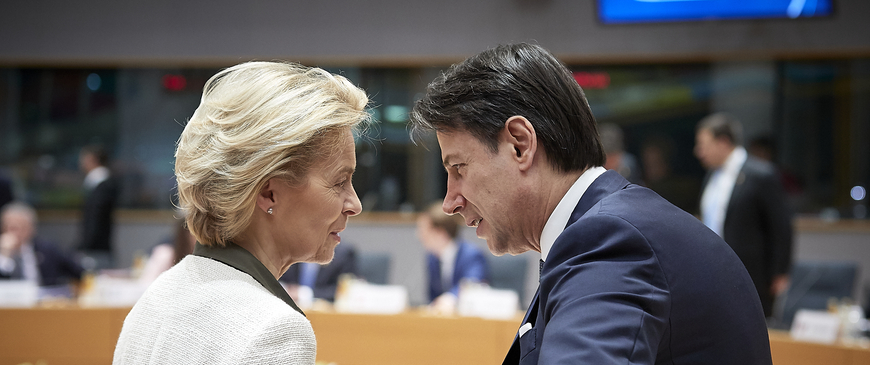
The EU needs to counter Italy's coronavirus-induced Euroscepticism
The coronavirus crisis may be unprecedented in living memory, but for many Italians the EU’s reaction has been no surprise. After the migration and eurozone crises, the EU’s initially poor response has reinforced concerns that the bloc is unwilling to help when Italy is most in need. Italy is the European country that has been hardest hit by the pandemic, with almost 14,000 deaths. After over three weeks of “lockdown” measures, there are signs that the rate of spread is slowing, but restrictions will need to remain for many weeks, if not months, strangling the economy.
European leaders must overcome their divisions and step up their efforts to minimise the fallout of the crisis, or Italy could easily disrupt the functioning of the Union. Over the past decade, Italy has gone from one of the most enthusiastic supporters of greater European integration to one of the most Eurosceptic member states. Many Italians felt that their country did not receive much European solidarity during its moments of need. This shift in public sentiment has been reflected in a rise of nationalism and Euroscepticism, with Matteo Salvini’s right-wing anti-immigration League among the main beneficiaries.
The way other EU countries initially responded to Italy’s coronavirus plight has shaped the narrative of the crisis and played into the hands of the Eurosceptics. In late February, Italy requested assistance, but no member state offered immediate assistance. Instead, several banned the export of essential medical equipment, fearing they would need it themselves. By contrast, Russia and China were only too happy to send medical equipment or teams of doctors to assist Italy. Even though these were self-interested public relations moves, Eurosceptic politicians were quick to praise them, arguing this proved European solidarity was a myth.
The EU has made up for its early missteps. The European Central Bank launched a €750bn Pandemic Emergency Purchase Programme, which can be used to buy Italian debt. The European Commission has persuaded member states to lift bans on the export of medical equipment, and suspended its rules on budget deficit limits and state aid. And several member states are now providing Italy with essential medical supplies and treating Italian patients in their hospitals.
Nevertheless, the risk is that much damage has already been done, as initial perceptions will not be easy to shift. The EU has also failed so far to communicate its actions to the Italian public, giving Eurosceptic politicians continued free rein to claim the bloc has let them down. The risk is this Eurosceptic narrative will only strengthen as countries disagree and delay on how to proceed. The debate over whether to finance emergency spending through joint debt instruments dubbed “coronabonds” has already shown signs of becoming toxic, exposing old faultlines between the eurozone’s northern and southern member states.
The way in which EU member states respond after the worst of the health crisis has passed will also be key. The EU’s third-biggest economy will struggle to return to growth or continue to finance its debt without a combination of EU-wide measures and ECB support. It is highly unlikely that other eurozone members would let Italy default on its debts as it would be too damaging to the euro and themselves. But there’s a real risk that European leaders do just enough to keep Italy solvent, but not enough to generate a substantial economic recovery or help reverse the Eurosceptic turn in its politics.
When elections are next held in 2023, Italians might elect an EU-phobic government led by Salvini. The chances of Italy’s exit from the euro, or even the EU, will have grown. Even a moderate government in Rome would be likely to take on a much more Eurosceptic hue. That would make it harder for the EU to find a consensus on how to tackle its big challenges, such as fighting climate change and regulating new technology. Rome would probably seek closer relations with China and Russia, making it much more difficult for the EU to formulate a coherent policy towards them.
It is in the interest of all EU member states to act decisively to reverse the Eurosceptic narrative taking hold in Italy. European leaders should increase their efforts to counter the economic effects of the crisis. A recently announced €100bn unemployment insurance scheme is a decent start. But whether in the form of coronabonds or under another label, member states also need to pool their collective economic resources to allow all member states to spend as much as they need to minimise the economic and political fallout of the pandemic. The EU itself also needs to be better at communicating its actions, showing Italians that it is contributing to efforts to counter the pandemic, and not standing in their way. Delay would be devastating for the Union.
Luigi Scazzieri is a research fellow at the Centre for European Reform.
